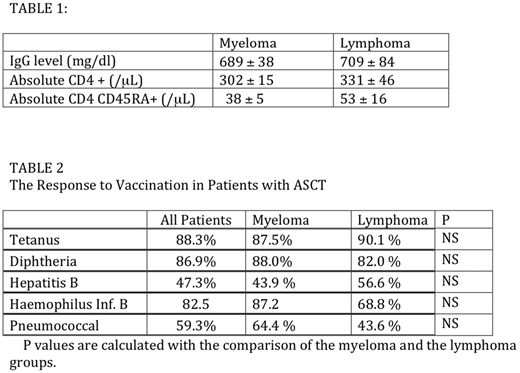Patients with autologous stem cell transplantation (ASCT) have a variable period of immune deficiency in the post-transplant period. Guidelines recommend revaccination of patients after ASCT as standard care. The response to vaccination may affect the outcome of the transplant patients. We aim to evaluate the vaccination response after ASCT. All myeloma and lymphoma patients with ASCT who had vaccination and measured vaccination response, were included in the study. We retrospectively evaluated 73 ASCT patients, 55 with multiple myeloma (MM) and 18 with lymphoma between 2013 and 2018. The current ASCT protocol for active immunization includes three doses of pneumococcal conjugate vaccine (PCV13) from 6-12 months after ASCT, followed by a 23-valent polysaccharide pneumococcal vaccine (PPSV23). Haemophilus Influenza B (HiB), hepatitis B, and TDAP/TD vaccines are administered within one year after initiation of vaccination. The responses to these vaccines were investigated by checking antibody titers at a minimum of two months after completion of vaccination.
Both MM and lymphoma groups had similar pre-vaccination immunologic parameters, including IgG levels, absolute CD4+, and CD4+CD45RA+ cell counts (Table 1). Diphtheria and tetanus had 89% response rate to the vaccination in all patients (Table 2). Only half of the patients (47%) responded to hepatitis B vaccine. The response was higher but not statistically significant in the lymphoma group compared to the MM group (57 % versus 43.9 % P: NS). More than 80% of the patients had a response to H. Influenza vaccine. All patients had a 59% response to pneumococcal vaccination. We then analyzed the pneumococcal responses according to serotype. PCV13 includes vaccine against 13 serotypes of S. pneumonia (1, 3, 4, 5, 6A, 6B, 7F, 9V, 14, 19A, 19F, 18C, and 23F). PPSV23 contains additional 11 serotypes (2, 8, 9N, 10A, 11A, 12F, 15B, 17F, 20, 22F, 33F). 76 % of MM patients responded to PCV13 serotypes, while only 41 % responded to PPSV23 specific serotypes (p: <0.01). Lymphoma patients also showed a similar response pattern. In addition, repeated vaccination with PPSV23 did not improve the response of failure patients. We also evaluated the effects of maintenance treatment in the myeloma patients. We found that maintenance treatment did not interfere with the vaccine response in the patients with myeloma after ASCT.
In conclusion, ASCT patients respond well to most vaccinations except for Hepatitis B and PPSV23. Further studies may need to explore pathophysiology of vaccine failure. Strategies to enhance immune reconstitution may augment the immune response and improve the outcome of the patients with ASCT.
Alpdogan:Seattle Genetics: Research Funding. Binder:Sanofi: Consultancy; Janssen: Membership on an entity's Board of Directors or advisory committees. Kasner:Jazz Pharmaceuticals: Membership on an entity's Board of Directors or advisory committees, Research Funding; Otsuka Pharmaceutical: Research Funding. Martinez-Outschoorn:Otsuka Pharmaceutical: Research Funding. Palmisiano:AbbVie: Research Funding; Genentech: Research Funding. Porcu:Viracta Therapeutics: Membership on an entity's Board of Directors or advisory committees; Celgene: Research Funding; Cell Medica: Research Funding; Daiichi: Consultancy, Honoraria; Galderma: Research Funding; Innate Pharma: Membership on an entity's Board of Directors or advisory committees, Research Funding; Kiowa Kirin: Research Funding; Kura Oncology: Research Funding; Miragen: Research Funding; Verastem: Consultancy. Flomenberg:Tevogen: Consultancy, Honoraria.
Author notes
Asterisk with author names denotes non-ASH members.


This feature is available to Subscribers Only
Sign In or Create an Account Close Modal